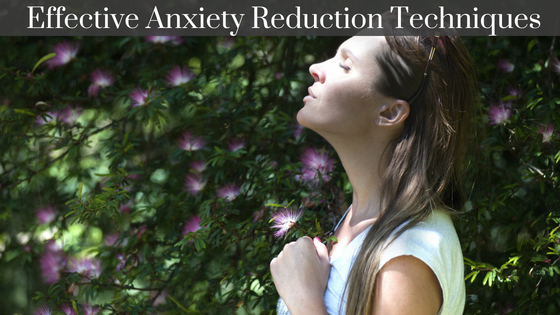Anxiety disorders affect 40 million adults. In fact, the Anxiety & Depression Association of America says that anxiety disorders are the most common of mental illness.
There are six different types of anxiety disorders. People who have anxiety typically have varying degrees of intensity.
If you have anxiety, chances are there are times you may feel stuck and unsure how to handle how you feel. Anxiety is often managed by medication but there are also other less intrusive techniques to help decrease your anxiety.
Tips to Reduce Anxiety Symptoms
- Breathe deeper: Many people don’t realize that when they breathe they take shallow breaths. During a time when you feel anxious, it’s very important to focus on how you are breathing. When you’re able to take deeper breaths, it can help your body to feel calmer and help to relieve the anxiety symptoms you are feeling at that time. Here is a deep breathing exercise from WebMD you can try. Also, check out this video of one of our experts demonstrating an effective breathing technique.
- Exercise: When you are physically active endorphins get released into your body. These natural feel-good chemicals help you relax and counter the body systems that cause you to feel tense. Whether you like to run or do yoga, every type of exercise is equally beneficial. Proper exercise can also help you get better sleep which helps to make sure the body is self-regulating more effectively.
- Practice meditation & visualization: The world around us is fast paced and can feel very overwhelming. Sometimes all we need is to pause for a moment. Take some quiet time for yourself and allow yourself to be engaged in the present moment. If you’re having trouble relaxing, try visualizing yourself in a calming place. Maybe you feel peaceful next to a waterfall or cozied up in a blanket? Try to imagine you’re in that place and then visualize your body resting there.
- Lessen the Caffeine: Research has shown high doses of caffeine can increase anxiety. Consuming too much of it can cause your body to feel jittery and your heart to race. The most common foods and drinks that contain caffeine are coffee and chocolate. It’s not bad to consume these, however, be sure to partake of them in moderation.
- Be mindful of your thoughts: One of the best ways to be aware of what you are thinking is to keep a journal and when you feel anxious, write down what you are thinking at that time. Take a breather and come back later to process your worries and fears. In some cases, you’ll be able to come up with a plan that can help to lessen the anxiety you feel about the situation.
Anxiety is not just a frame of mind. Sometimes you can try all the above techniques and you’re not able to manage it on your own. It’s important at this point, to make sure to see a professional to ensure you’re getting the right care plan.

